|
|
|
Sort Order |
|
|
|
Items / Page
|
|
|
|
|
|
|
| Srl | Item |
| 1 |
ID:
151981
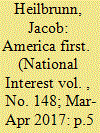

|
|
|
|
|
| Summary/Abstract |
IN HIS inaugural address, Donald Trump vowed to shun globalism and follow a policy of America First. “We do not seek to impose our way of life on anyone,” Trump said, “but rather to let it shine as an example. We will shine for everyone to follow.” His statement captured the division over American foreign policy since the founding of the republic, though it may be wondered whether Trump himself is closely acquainted with this divide. He has, after all, declared his unfamiliarity with the tenebrous origins of America First, which was once the rallying cry of a motley crew of isolationists and anti-Semites who opposed American entry into World War II. Trump’s embrace of the slogan, however, has revived a fundamental question that Americans have confronted since the founding. Should the United States intervene abroad to promote liberty and prosperity? Or should it look inward, focusing on rebuilding at home?
|
|
|
|
|
|
|
|
|
|
|
|
|
|
|
|
| 2 |
ID:
171638
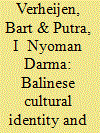

|
|
|
|
|
| Summary/Abstract |
The island of Bali has been inextricably bound up with the tourism industry. This article examines the dynamic Balinese cultural identity and its ever changing relationship with tourism in the age of globalism through the analysis of a case study: the construction of the Garuda Wisnu Kencana Cultural Park (between 1993–2018), containing an enormous statue of the Hindu God Wisnu mounting the magical bird Garuda. The park and statue can be seen as a new cultural landmark for the Indonesian nation and for the Balinese tourism industry. However, the case study of the park also shows how Bali has changed its role within the Indonesian archipelago since the fall of the Suharto regime in 1998 while dealing with new challenges of global tourism. Representations of a Balinese cultural identity have evolved from national, top-down level constructions of ‘cultural tourism’ into a global tourist destination through hosting international events at the park.
|
|
|
|
|
|
|
|
|
|
|
|
|
|
|
|
| 3 |
ID:
120114
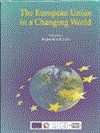

|
|
|
|
|
| Publication |
New Delhi, Radiant Publishers, 2002.
|
| Description |
x,307p.hbk
|
| Standard Number |
8170272483
|
|
|
|
|
|
|
|
|
|
|
|
Copies: C:1/I:0,R:0,Q:0
Circulation
| Accession# | Call# | Current Location | Status | Policy | Location |
| 057235 | 320.94/JAI 057235 | Main | On Shelf | General | |
|
|
|
|
| 4 |
ID:
151218
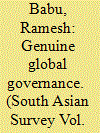

|
|
|
|
|
| Summary/Abstract |
Revolutionary changes sweeping the world since the mid-1980s have transformed international and global politics. Major issues and challenges confronting mankind have become global and demand global solutions. However, present international institutions are out of tune with today’s realities. Reforms will not do. New forms of global governance are needed. This is an opportune time for the Global South (Third World) to rise to the occasion and offer viable alternative conceptions of global governance that are more cooperative, inclusive, equitable and legitimate. Towards this end, mankind has to draw from all the living civilisations on earth and formulate a ‘confluence of cultures’ as the conceptual foundation for ‘genuine global governance’. Mankind needs a new ‘philosophy of globalism’. In this context, Hindu civilisation’s ideas on the rights and duties of man; man’s relationship with his family, community and society; his place on earth; and its emphasis on living in tune with nature deserve attention.
|
|
|
|
|
|
|
|
|
|
|
|
|
|
|
|
| 5 |
ID:
001858
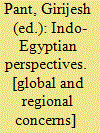

|
|
|
|
|
| Publication |
New Delhi, School of Internationational Studies, 1999.
|
| Description |
xx,202p.
|
|
|
|
|
|
|
|
|
|
|
|
Copies: C:1/I:0,R:0,Q:0
Circulation
| Accession# | Call# | Current Location | Status | Policy | Location |
| 042824 | 327.54062/PAN 042824 | Main | On Shelf | General | |
|
|
|
|
| 6 |
ID:
107306
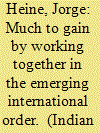

|
|
|
| 7 |
ID:
167195
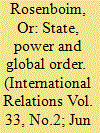

|
|
|
|
|
| Summary/Abstract |
This article examines the evolution of international thought through the notion of ‘political space’. It focuses on two important domains of international politics, the nation-state and the global, to reflect on spatial categories in the discipline of International Relations (IR). Since its inception, the concept of the nation-state has dominated mainstream IR theory. Yet an investigation of how international order has been theorized over IR’s first century shows that this era has also been defined by globalist visions of political order. Nowadays, globalization is sometimes seen as the apex of the historical interplay of particularity and universality. The progression towards global political and economic order, however, is today undermined by the resurgence of state-centric political nationalism which seeks to challenge the legitimacy of the global political space. By examining how past international thinkers including Alfred Zimmern, Barbara Ward, Hans Morgenthau, E. H. Carr and John Herz, imagined and interpreted the relations of space and politics in the national and global spheres, this article suggests that spatial thinking offers an insightful approach for theorizing international relations. The article argues that the global and national spaces attain their political meanings through divisions as well as interactions and connections. The focus on divisions, exemplified in the writings of Barbara Ward, helps to make sense of the modus operandi of power in the national and global political spaces by investigating differences, tensions and instability.
|
|
|
|
|
|
|
|
|
|
|
|
|
|
|
|
|
|
|
|
|